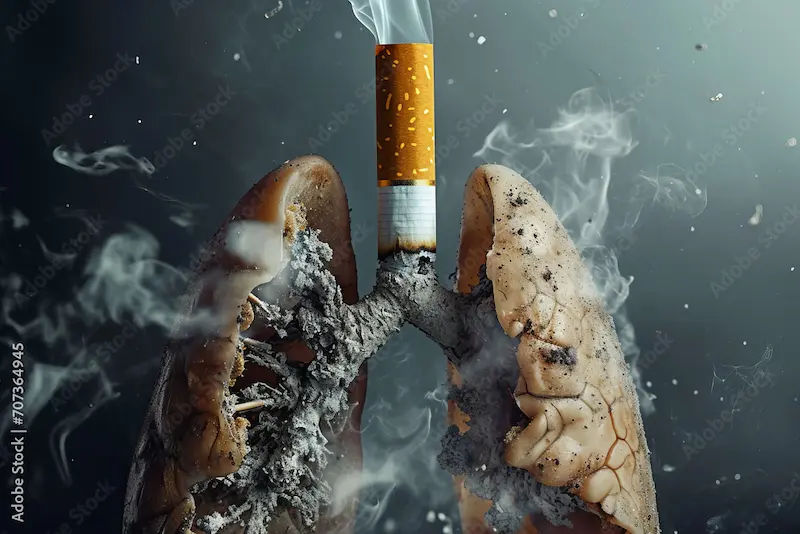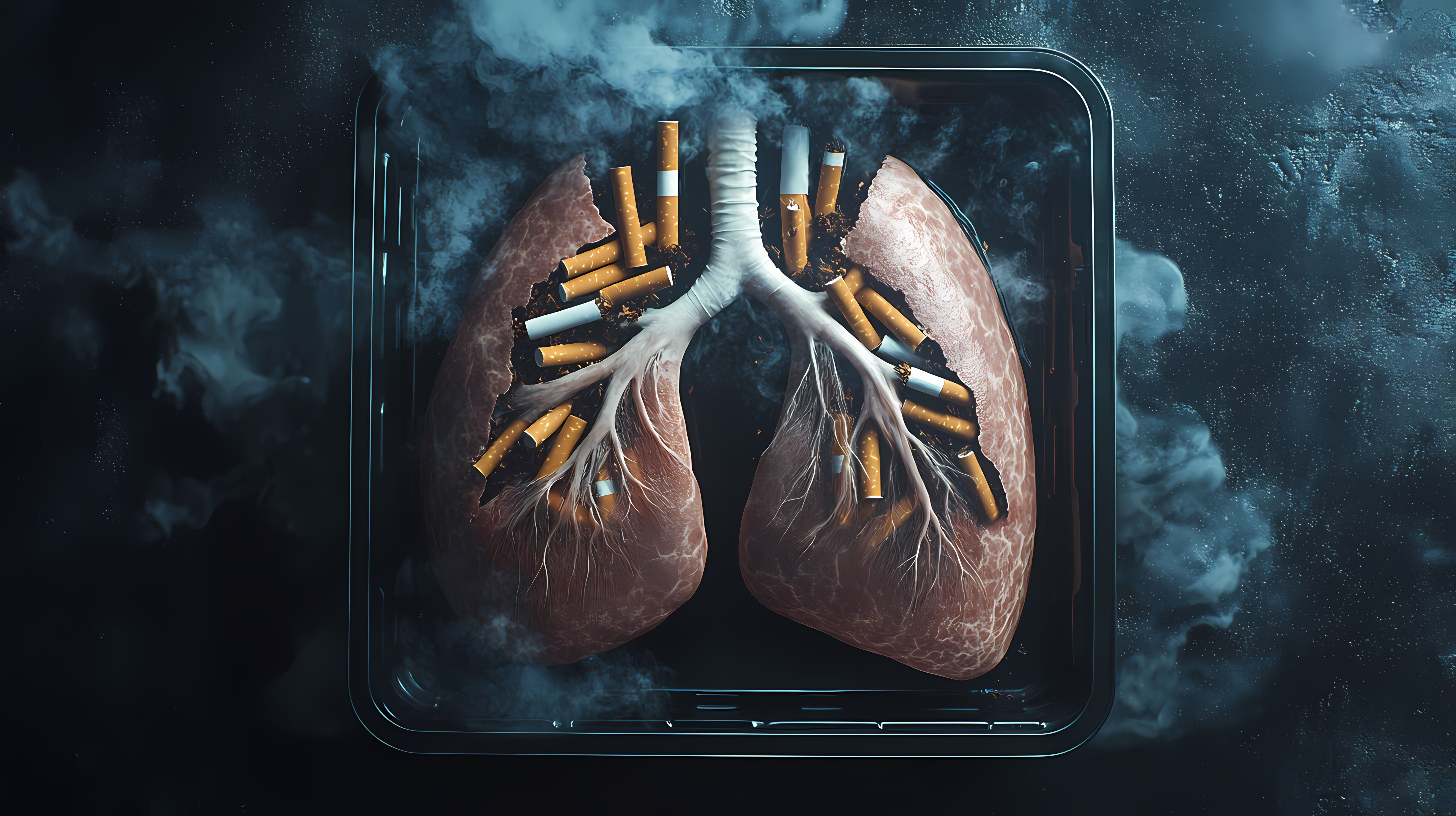Tobacco Effects on Heart Brain And Skin
Learn how tobacco use affects your heart, brain, and skin, and understand the health risks associated with smoking and nicotine consumption.

Written by Dr. J T Hema Pratima
Reviewed by Dr. Rohinipriyanka Pondugula MBBS
Last updated on 13th Jan, 2026

Introduction
We often think of smoking as a habit that harms the lungs, but its destructive path extends far deeper, impacting the very core of our health: our heart, our brain, and our skin. Every puff on a cigarette unleashes a storm of over 7,000 chemicals into your bloodstream, which then travel to every organ, causing silent, cumulative damage. This article goes beyond the lungs to uncover the profound effects of tobacco on your cardiovascular system, cognitive function, and your skin's youthfulness. Understanding this interconnected toll is the first powerful step toward reclaiming your health. We'll break down the science, reveal the risks, and highlight the remarkable recovery your body is capable of once you decide to quit.
The Harsh Truth: Tobacco's Chemical Assault on Your Body
Before we delve into specific organs, it's crucial to understand what you're introducing into your body. Tobacco smoke is not just nicotine; it's a complex, toxic cocktail. Nicotine is the highly addictive substance that keeps you coming back, but it's the other chemicals that do the most physical damage. These include tar, a sticky residue that coats the lungs; carbon monoxide, a poisonous gas that hijacks red blood cells; and formaldehyde, ammonia, and hydrogen cyanide, all of which have devastating effects on your body's tissues and functions.
Beyond Nicotine: The Cocktail of Toxins
This mixture of toxins triggers widespread inflammation and oxidative stress. Oxidative stress occurs when harmful molecules called free radicals overwhelm your body's ability to neutralize them. This process damages DNA, proteins, and cell membranes, accelerating aging and disease processes throughout the body, from your arteries to your skin cells.
How These Chemicals Travel and Attack
When you inhale, these chemicals are rapidly absorbed through the lungs into your bloodstream. Within seconds, they are carried to every part of your body. This is why smoking doesn't just cause local lung damage; it's a full-body assault. The carbon monoxide binds to haemoglobin in your red blood cells much more tightly than oxygen, drastically reducing the amount of life-sustaining oxygen delivered to your organs, including your heart and brain.
Consult Top Cardiologists For Personalised Tips
How Tobacco Ravages Your Heart and Circulatory System
Your cardiovascular system is a primary target for tobacco's toxins. Smoking is a leading cause of heart disease and stroke, and the mechanisms are well-understood.
The Direct Link to Heart Disease and Atherosclerosis
The chemicals in smoke damage the delicate lining of your arteries (the endothelium). This damage allows fatty deposits (plaque) to build up more easily, a process called atherosclerosis. As these plaques grow, they narrow and stiffen the arteries, restricting blood flow. This is often the root cause of coronary artery disease, which can lead to chest pain (angina) and, ultimately, a heart attack.
Increased Risk of Heart Attack and Stroke
Narrowed arteries are a ticking time bomb. If a plaque ruptures, a blood clot can form, completely blocking the blood flow. If this happens in an artery supplying the heart, it causes a heart attack. If it happens in an artery supplying the brain, it causes an ischemic stroke. Furthermore, nicotine causes your adrenal glands to release adrenaline, which increases your heart rate and blood pressure, forcing your heart to work harder and under more stress.
Smoking and High Blood Pressure: A Dangerous Duo
The combination of vasoconstriction (nicotine causing blood vessels to tighten) and increased heart rate leads to hypertension, or high blood pressure. This constant pressure further damages artery walls, creating a vicious cycle of cardiovascular deterioration. If you experience persistent chest pain, shortness of breath, or irregular heartbeat, consult a doctor online with Apollo24|7 for further evaluation.
Tobacco's Attack on Your Brain and Mental Health
The brain, which consumes about 20% of the body's oxygen, is extremely vulnerable to the reduced oxygen supply caused by carbon monoxide and narrowed arteries.
Shrinking Brain Volume and Cognitive Decline
Studies using MRI scans have shown that smoking is linked to a reduction in brain volume, particularly in the cortex, where vital functions like memory, language, and perception occur. This contributes to an accelerated decline in cognitive function and a significantly higher risk of dementia, including Alzheimer's disease, later in life.
The Heightened Risk of Stroke and Aneurysm
As discussed, the atherosclerosis and blood clots caused by smoking can lead to strokes. A stroke occurs when brain cells are deprived of oxygen and die, potentially leading to permanent disability. Smoking also weakens blood vessel walls, increasing the risk of a cerebral aneurysm, a bulging, weak spot that can burst and cause a hemorrhagic stroke.
Nicotine, Dopamine, and Mental Health Disorders
While nicotine initially stimulates the release of dopamine (a "feel-good" neurotransmitter), it eventually alters your brain's natural reward circuitry. This leads to addiction and can exacerbate underlying mental health conditions. Smokers have higher rates of anxiety and depression. The addiction cycle itself creates stress, as the brain becomes dependent on nicotine to function normally, leading to withdrawal symptoms like irritability and brain fog when trying to quit.
How Smoking Accelerates Skin Aging and Causes Damage
Your skin is the body's largest organ, and it directly reflects the internal damage caused by smoking. The phenomenon known as "smoker's face" is a real clinical sign.
Premature Wrinkling and "Smoker's Face"
Smoking drastically accelerates skin aging. The toxins break down collagen and elastin, the fibres that give skin its strength and elasticity. This leads to deep wrinkles, particularly around the mouth (from the pursing action) and eyes (from squinting against smoke). Skin also becomes dry, leathery, and often has a grayish, uneven tone due to reduced blood flow and oxygen.
Impaired Wound Healing and Increased Infection Risk
The reduced blood flow and oxygen delivery mean the skin loses its vitality and ability to repair itself. Simple cuts and scrapes take longer to heal. This also increases the risk of skin infections and post-surgical complications. For example, a surgical incision is much more likely to get infected or reopen in a smoker.
The Link Between Smoking and Skin Cancer
Smoking is a proven risk factor for squamous cell carcinoma, a common type of skin cancer. The carcinogens in tobacco smoke can directly damage the DNA in skin cells, leading to mutations and uncontrolled cell growth.
The Silver Lining: How Your Body Heals After You Quit
The incredible news is that the human body has a profound ability to heal itself once the assault of tobacco stops.
The Timeline of Recovery: From 20 Minutes to 15 Years
20 minutes: Heart rate and blood pressure drop to normal.
12 hours: Carbon monoxide level in your blood drops to normal.
2 weeks to 3 months: Heart attack risk begins to drop. Lung function improves.
1 to 9 months: Coughing and shortness of breath decrease.
1 year: Risk of coronary heart disease is half that of a smoker's.
5 years: Risk of stroke falls to that of a non-smoker.
10 years: Risk of lung cancer death is about half that of a continuing smoker. The risk of other cancers drops.
15 years: Risk of coronary heart disease is that of a non-smoker.
Noticeable Improvements in Skin Health
Within just a few weeks of quitting, skin tone and color begin to improve as blood flow returns. The halted attack on collagen allows the skin to begin repairing itself. While existing deep wrinkles may not disappear, the progression of premature aging stops immediately.
Long-Term Benefits for Heart and Brain Function
The risk of deadly cardiovascular events plummets. Arteries begin to heal, and blood pressure often normalizes. For the brain, quitting improves cognitive function, reduces the risk of stroke, and significantly lowers the long-term risk of dementia. Apollo24|7 offers a convenient home collection for tests like cholesterol panels and HbA1c, which can help you monitor your cardiovascular health after quitting.
Get Your Health Assessed
Conclusion
The evidence is clear and overwhelming: tobacco use is one of the most damaging choices for your holistic health, with its impact resonating through your most vital organs. It strangles your heart, starves your brain, and ages your skin prematurely. However, this narrative doesn't have to be yours. The decision to quit smoking is the single most powerful step you can take to reclaim your health. The journey may be challenging, but the rewards are immediate and lifelong: a stronger heart, a sharper mind, and healthier, more vibrant skin. Your body is waiting to heal. Take that first step today by seeking support from healthcare professionals, quitlines, or loved ones. Your future self will thank you for it.
Consult Top Cardiologists
Consult Top Cardiologists For Personalised Tips

Dr. Dayanashre N
General Physician
3 Years • MBBS
Bengaluru
PRESTIGE SHANTHINIKETAN - SOCIETY CLINIC, Bengaluru

Dr. Bhethala Sharan Prakash
General Physician/ Internal Medicine Specialist
5 Years • MBBS MD
Bengaluru
PRESTIGE SHANTHINIKETAN - SOCIETY CLINIC, Bengaluru

Dr. Anand Ravi
General Physician
2 Years • MBBS
Bengaluru
PRESTIGE SHANTHINIKETAN - SOCIETY CLINIC, Bengaluru

Dr. Tripti Deb
Cardiologist
40 Years • MBBS, MD, DM, FACC, FESC
Hyderabad
Apollo Hospitals Jubilee Hills, Hyderabad

Dr. Zulkarnain
General Physician
2 Years • MBBS, PGDM, FFM
Bengaluru
PRESTIGE SHANTHINIKETAN - SOCIETY CLINIC, Bengaluru
Consult Top Cardiologists

Dr. Dayanashre N
General Physician
3 Years • MBBS
Bengaluru
PRESTIGE SHANTHINIKETAN - SOCIETY CLINIC, Bengaluru

Dr. Bhethala Sharan Prakash
General Physician/ Internal Medicine Specialist
5 Years • MBBS MD
Bengaluru
PRESTIGE SHANTHINIKETAN - SOCIETY CLINIC, Bengaluru

Dr. Anand Ravi
General Physician
2 Years • MBBS
Bengaluru
PRESTIGE SHANTHINIKETAN - SOCIETY CLINIC, Bengaluru

Dr. Tripti Deb
Cardiologist
40 Years • MBBS, MD, DM, FACC, FESC
Hyderabad
Apollo Hospitals Jubilee Hills, Hyderabad

Dr. Zulkarnain
General Physician
2 Years • MBBS, PGDM, FFM
Bengaluru
PRESTIGE SHANTHINIKETAN - SOCIETY CLINIC, Bengaluru
More articles from Smoking Cessation
Frequently Asked Questions
Does vaping cause the same damage to the heart, brain, and skin as smoking?
While often marketed as safer, vaping is not harmless. E-cigarettes still deliver nicotine, which harms blood vessels and is addictive. They also contain other chemicals and metals that can cause inflammation and oxidative stress, posing risks to cardiovascular and brain health. The long-term effects on the skin are still being studied, but nicotine itself impairs blood flow.
How long after quitting smoking will my skin look better?
You may notice improvements in skin tone and hydration within a few weeks as blood flow improves. However, reversing existing wrinkles takes much longer and may not be complete. The most significant benefit is halting further premature aging.
Can the brain damage from smoking be reversed?
Yes, to a significant extent. Quitting smoking can improve cognitive function, memory, and focus. The risk of stroke begins to drop immediately and continues to decline over time. While some damage may be permanent, quitting prevents further harm and allows the brain to function at its best capacity.
Is it worth quitting smoking if I've done it for decades?
Absolutely. Quitting at any age offers significant health benefits. Even after decades of smoking, quitting lowers your risk of heart attack, stroke, and cancer compared to those who continue to smoke. It's never too late to quit.
Does smoking just a few cigarettes a day still cause damage?
Yes. There is no safe level of smoking. Even light or 'social' smoking causes immediate damage to your blood vessels and increases your risk of developing smoking-related diseases. The damage is dose-dependent, meaning the more you smoke, the higher the risk, but any amount is harmful.




_0.webp)
